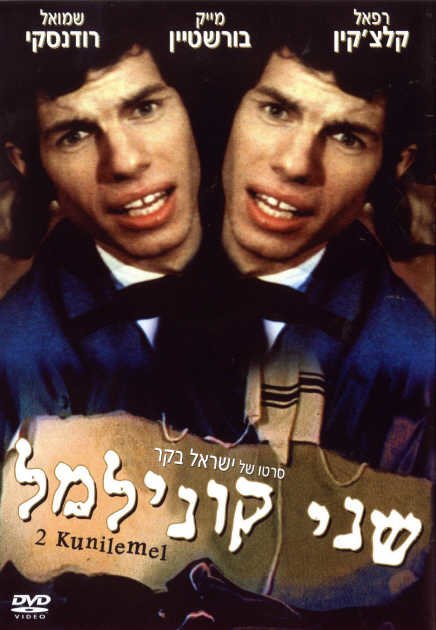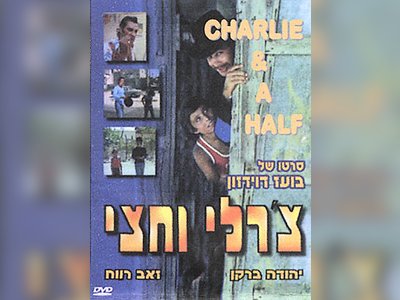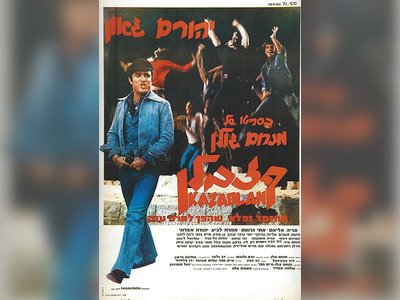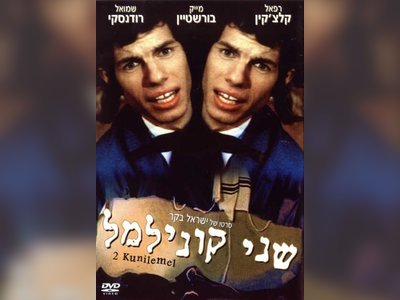מורשת גדולי האומה
בזכותם קיים
beta
"Two Coins for the Bride (Film)"

"Two Coins for the Bride" remains a significant chapter in the history of Israeli cinema, not only for its commercial success but also for its influence in shaping the depiction of religious characters in subsequent films and plays. Burstyn's portrayal of Kuni Lemel added a layer of complexity to the representation of religious figures, setting the stage for further exploration of this theme in Israeli cinema.
"Two Coins for the Bride" is an Israeli comedy film from 1966, based on the Hebrew operetta "Shnei Kuni Lemel" by Abraham Goldfaden. Directed by Mike Burstyn, the film features him portraying two parallel characters, Kuni and Max, in a comedic tale of mistaken identities set against the backdrop of the shtetl (Jewish village). Burstyn also sings the iconic Kuni Lemel song, "They Say That I Am Not Myself," in the film. This movie marked Burstyn's debut in the world of cinema and inaugurated the "Kuni Lemel" film series.
Plot:
The film tells the story of Kuni Lemel's attempt to marry Carolina, the daughter of his uncle Shalom Monia Friedberg, the leader of the Jewish community in Shichravka. Complications arise when Max, the clever student son of Dr. Kavtznetsk, also pursues Carolina. In an effort to prevent Kuni Lemel's marriage to Carolina, Max pretends to be Kuni Lemel due to their uncanny resemblance, leading to a comedy of errors. Rabbi Klaman, the matchmaker, attempts to find a suitable groom for his daughter while also trying to arrange Kuni Lemel's marriage to Carolina, as per her father's wishes, who seeks to distance her from Max, whom she loves. In the end, Kuni Lemel marries Libele, the matchmaker's daughter, while Max marries his beloved Carolina in the house of Rabbi Pinchasle, the town's leader in Kavtznetsk.
Reception:
The film achieved remarkable success, with a total of 900,000 tickets sold, making it the fifth most commercially successful film in the history of Israeli cinema, following "Eskimo Limon," "Kazablan," "Sallah Shabati," and "Two Fingers from Sidon." By the end of 1967, it had been viewed by 876,200 people and generated a net profit of 451,300 Israeli pounds for the producers, who had invested approximately 900,000 Israeli pounds in the production. Two sequels were made: "Kuni Lemel in Tel Aviv" and "Kuni Lemel in Cairo," although they did not achieve the same level of success as the original film. While the central theme of family members of differing religious backgrounds remained in the sequels, the character of the secular Max was altered slightly. In the first film, Kuni and Max were cousins, while in the sequels, the central characters were Kuni and Moni, the twin brothers.
Analysis:
"Two Coins for the Bride" falls into the genre of Yiddish theater films. The character of Kuni Lemel is notably crafted to reflect the satirical view of the secular society towards the religious figure. This portrayal created a stereotypical archetype of "the religious" figure in subsequent films and plays. For example, Jackie Levy remarked, "The religious Jews who broke through into prime roles were always portrayed as weak and submissive. If there are two brothers in 'Kuni Lemel,' the religious one will be the meek and submissive."
Cinema critic Meir Shnitzer commented on the film, stating that while "Two Coins for the Bride" was not considered a milestone in Israeli cinema, it made an enormous contribution to shaping the portrayal of religious or, more precisely, Hasidic characters. Kuni Lemel, although a Hasidic youth from the shtetl, set the tone for the representation of religious characters in Israeli cinema.
Plot:
The film tells the story of Kuni Lemel's attempt to marry Carolina, the daughter of his uncle Shalom Monia Friedberg, the leader of the Jewish community in Shichravka. Complications arise when Max, the clever student son of Dr. Kavtznetsk, also pursues Carolina. In an effort to prevent Kuni Lemel's marriage to Carolina, Max pretends to be Kuni Lemel due to their uncanny resemblance, leading to a comedy of errors. Rabbi Klaman, the matchmaker, attempts to find a suitable groom for his daughter while also trying to arrange Kuni Lemel's marriage to Carolina, as per her father's wishes, who seeks to distance her from Max, whom she loves. In the end, Kuni Lemel marries Libele, the matchmaker's daughter, while Max marries his beloved Carolina in the house of Rabbi Pinchasle, the town's leader in Kavtznetsk.
Reception:
The film achieved remarkable success, with a total of 900,000 tickets sold, making it the fifth most commercially successful film in the history of Israeli cinema, following "Eskimo Limon," "Kazablan," "Sallah Shabati," and "Two Fingers from Sidon." By the end of 1967, it had been viewed by 876,200 people and generated a net profit of 451,300 Israeli pounds for the producers, who had invested approximately 900,000 Israeli pounds in the production. Two sequels were made: "Kuni Lemel in Tel Aviv" and "Kuni Lemel in Cairo," although they did not achieve the same level of success as the original film. While the central theme of family members of differing religious backgrounds remained in the sequels, the character of the secular Max was altered slightly. In the first film, Kuni and Max were cousins, while in the sequels, the central characters were Kuni and Moni, the twin brothers.
Analysis:
"Two Coins for the Bride" falls into the genre of Yiddish theater films. The character of Kuni Lemel is notably crafted to reflect the satirical view of the secular society towards the religious figure. This portrayal created a stereotypical archetype of "the religious" figure in subsequent films and plays. For example, Jackie Levy remarked, "The religious Jews who broke through into prime roles were always portrayed as weak and submissive. If there are two brothers in 'Kuni Lemel,' the religious one will be the meek and submissive."
Cinema critic Meir Shnitzer commented on the film, stating that while "Two Coins for the Bride" was not considered a milestone in Israeli cinema, it made an enormous contribution to shaping the portrayal of religious or, more precisely, Hasidic characters. Kuni Lemel, although a Hasidic youth from the shtetl, set the tone for the representation of religious characters in Israeli cinema.
- שני קוני למל (סרט)he.wikipedia.org




